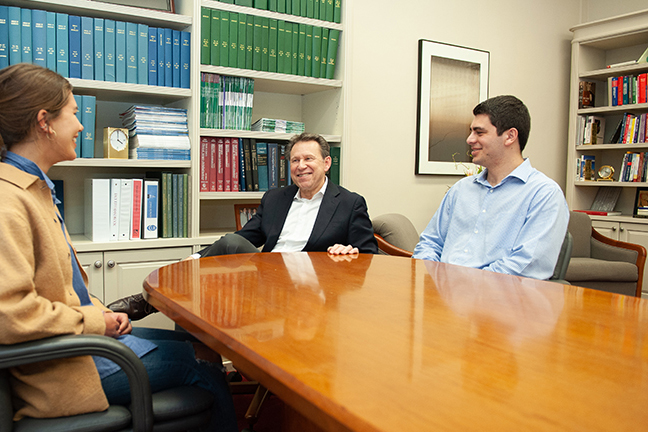University of Redlands Emergency Alert System
Alert Received: . For more information, visit: https://www.redlands.edu/alert/
University of Redlands
- Home
- Och Tamale
- Spring 2019
- Thoughts from the President's Office

Sometimes a few remarks by a mentor can change the course of an entire life. That’s what happened in my case when my seventh-grade English teacher, Michael Harada, gave me feedback on a class assignment—an essay that was to include a paragraph on our strengths, one on our weaknesses, and one on what we wanted to do “when we grew up.”
My essay declared I wanted to be a pediatric dentist in Pasadena when I grew up, just like my own dentist, because he got to wear Hawaiian shirts to work. Remember, I was a superficial 13-year-old! Harada wrote in the margin, “Ralph, you are a very smart young man. You ought to think about medicine.” It hadn’t occurred to me before. From then on, my parents would introduce me at family events by saying, “Here’s my son, Ralph. He’s thinking about becoming a doctor.”
Harada and I became lifelong friends, and he was able to relish my admission to the University of Chicago Pritzker School of Medicine and choice of neurology as a career. Another comment on that same essay also shaped my perspective going forward. In a lengthy paragraph, I had described my greatest weakness, according to my family—that I was argumentative just like my grandfather. Harada responded, “Ralph, having an argument is not always a bad thing. Sometimes you learn something.” It seemed clear to my mentors that a combination of questioning authority and the joy of debate might direct me toward the life of a professor.
Mentors continued to help chart my course, including David Cole, a renowned professor of psychology and “the father figure of American collegiate psychology,” who took me under his wing during my college years. Perhaps the most remarkable aspect of this relationship is that he was still advising me almost three decades later, when I began to explore the crazy idea of veering away from my successful career in research and patient care to pursue leadership in higher education. Cole’s advice—to talk to some of his own advisors in the field and to recraft my CV so it highlighted my musical pursuits, rounding out the science and medicine—were pivotal in my career.
The mentor-protégé relationship is a special one, and it takes a distinctive kind of effort on both sides to fulfill its potential. Mentors need to truly listen and respond to the aspirations of their protégés, rather than their own. Ironically, in a work setting, this means mentors need to be prepared to lose some of their best people. On the other side of the mentorship equation, protégés need to ready themselves to actually follow their mentor’s advice, even if it leads them out of their comfort zone—perhaps not as easy as it first seems.
Just as the responsibilities of mentorship go both ways, the benefits of mentorship are by no means one-sided. While protégés receive a boost toward their goals, mentors benefit from a new perspective and honor their own mentors by paying it forward. My curriculum vita reflects the importance I place on mentoring, listing many of my protégés—who are now college presidents, department chairs, center directors, deans, and practicing physicians and surgeons—all of whose careers I follow to this day.
At the University of Redlands, mentorship is an ongoing endeavor. Every year at convocation, I welcome the entering class and note that any student is invited to come and meet with me, just because I want to really know them. While some students regularly take me up on that offer, many more find caring and highly influential Redlands mentors through other avenues—often their professors in programs of study, but also their coaches, advisors, or leaders of extracurricular activities. The enormous impact of Redlands mentors can be seen throughout the pages of this issue of Och Tamale magazine, where you will meet Bulldogs who challenge, inspire, and support their protégés, as well as those whose lives are forever changed by this guidance.
Also in these pages, you will find an announcement we made as this issue was going to press. The U of R and San Francisco Theological Seminary have signed an agreement in principle that paves the way for an embedment of the Seminary into a newly created Graduate School of Theology within U of R. This alliance integrates a gorgeous, sylvan campus in Marin County into the University, and along with it opportunities for use not only by the new graduate school, but also by the School of Education, School of Business, School of Music, and College of Arts and Sciences. This development has the potential to enhance greatly the academic mission and student experience of both institutions by building on our common commitment to teaching, scholarship, and community. Stay tuned for more information online at www.redlands.edu/bulldogblog and in the next issue of Och Tamale magazine.
Forever yours,
Ralph W. Kuncl, PhD MD
President
University of Redlands